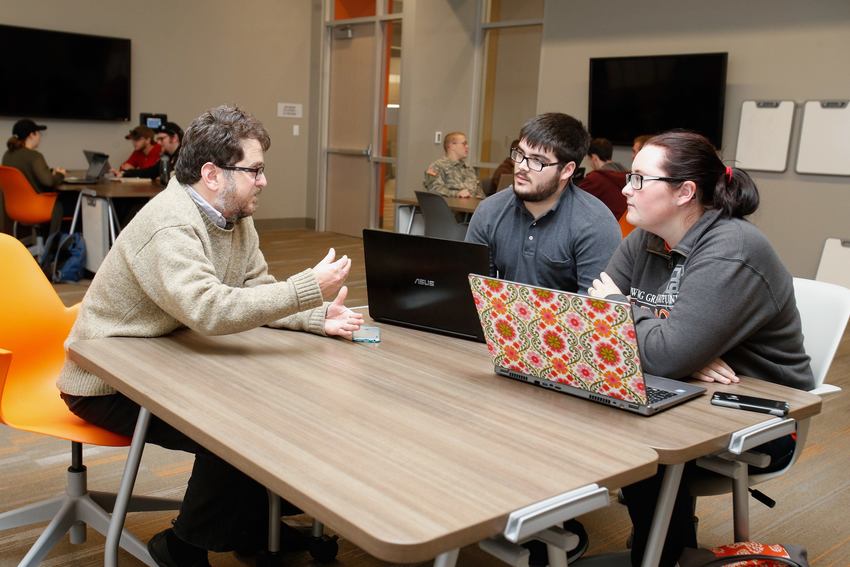
Master of Arts (M.A.)
History
You can do well in the work world doing what you love. Join a community of passionate historians in the BGSU master’s program. Our graduate history students work closely with nationally and internationally known scholars, and go on to land a wide variety of jobs.
Our curriculum offers a deep exploration of historical events and how they shape our current lives, encourages critical thinking and fosters an understanding of diverse cultures. It provides the academic depth and research opportunities to delve into your specific interests – whether you're drawn to political shifts, cultural transformations or economic developments.
Our M.A. program focuses on the training you need to meet professional needs in K-12 education, higher education, museums, historical societies, cultural heritage institutions and other areas. Partnerships with alumni and historical institutions create internship and educational opportunities.
Register now for a virtual info session about recent alumni placement, flexible enrollment options and career outlook on Nov. 18, 3-3:30 p.m.
Program highlights
- Flexible and convenient online options and dynamic face-to-face courses emphasize archival work and field experiences.
- Financial support. A high percentage of our master’s students receive research or teaching assistantships with tuition waivers and stipends. We also offer financial support to present papers at professional meetings and to conduct archival research.
- Engaged, expert faculty. BGSU history faculty study a wide range of topics. They are involved in national, regional and local initiatives and host guest lectures and history events. Our department’s main strengths are:
- A focus on the U.S. and other regions of the world (Africa, Asia, Europe, the Americas)
- Training in cultural, diplomatic, military, policy and social history
- Experience in public history, including exhibits and curation, digital galleries, podcasts and cultural heritage management preservation
- The application of history outside of academia (collections management, policy making and public engagement)
- Crossing chronological, geographic and thematic boundaries (Everything has a history!)
- Networking opportunities. Our alumni and partner organizations are instrumental in providing internships and other rewarding educational and job opportunities to our students.
- Academic options. BGSU offers a variety of ways to enhance your master’s degree in history.
- Dual master’s degree programs in history and German or history and Spanish
- Graduate certificate in history for educators and professionals
- Graduate certificate in public history
- Graduate certificates in ethnic studies and women’s, gender and sexuality studies
- Professional organizations. Join BGSU’s local branch of the Phi Alpha Theta professional society. Its mission is to promote the study of history through encouraging research, good teaching, publication and the exchange of ideas among historians. Our students also are active members of the National Council on Public History, Ohio Academy of History and many other organizations.
Career opportunities
Our alumni find jobs in public history, education, government and nonprofit organizations such as these:
- Director of education, National First Ladies Library and Museum
- Historic interpreter, Andrew Jackson Hermitage
- Archives technician, U.S. National Archives
- Historian, Rutherford B. Hayes Presidential Library and Museums
- Assistant curator, C.M. Russel Museum of Art in the American West
- Human resources specialist, U.S. Environmental Protection Agency, Office of Mission Support
- Admissions counselor, University of Findlay
- High school social studies teacher, Tri-Valley High School
- Manager of operations, Fort Meigs Historic Site
BGSU has a strong record of placing graduates in Ph.D. programs. Our graduates have enrolled in history doctoral programs at University of Tennessee, George Mason University, Loyola University and many others.
Curriculum
M.A. history students pursue one of two academic plans:
- Plan I is recommended for students who intend to continue graduate study beyond the master’s degree. It requires:
- Minimum of 24 semester hours of coursework
- Formal written thesis (equals 6 credit hours)
- Passage of an oral examination
- Plan II students are required to:
- Complete an approved course of study comprising a minimum of 30 semester hours
- Pass a final comprehensive examination OR present and defend a public history capstone project
BGSU master’s students in history are free to enroll in any graduate history course and up to six credits of graduate-level classes in related programs, including:
- American culture studies
- Ethnic studies
- Political science
- Popular culture
- Sociology
- Women’s studies
- World languages
Our history graduates develop:
- Critical habits of mind
- Project management skills
- Advanced research skills: the ability to locate, evaluate, interpret and analyze a broad range of evidence
- A facility for contextualizing current issues by placing them in historical perspective
- The capacity to communicate insights effectively orally and in writing

Sample courses
- Archives Administration
- Museology
- Podcasting
- Public history courses, including Introduction to Policy History
- Seminars in History (Capitalism, Oral History, Revolutions, World War II)
- Region-based courses (Ancient Rome, Canada, Modern Africa, Modern Mexico)
- Topics in the History of the Environment and Health
Dual degree options
You may choose to apply to our dual master’s degree programs in history and German or history and Spanish. You must apply to and be accepted by both the Department of History and the relevant foreign language department. Dual degree students spend a year at Universität Salzburg in Salzburg, Austria, or at Universidad de Alcalá in Henares, Spain.
The history program is part of the Department of History in the College of Arts and Sciences.
Accreditation
Bowling Green State University [BGSU] is accredited by the Higher Learning Commission. BGSU has been accredited by the Higher Learning Commission since 01/01/1916. The most recent reaffirmation of accreditation was received in 2022-2023, with our next reaffirmation of accreditation scheduled for 2032-2033. Questions should be directed to the Office of Institutional Effectiveness.
Updated: 09/25/2024 04:58PM

